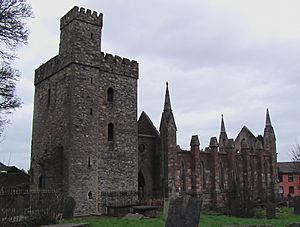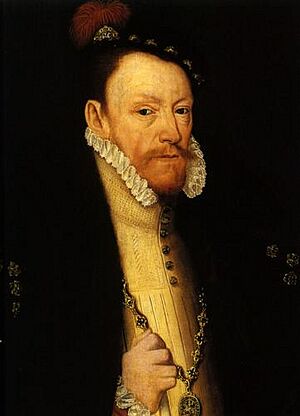John Parker (Irish judge) facts for kids
John Parker (around 1500–1564) was an important English merchant, politician, and judge in Ireland during the time of the Tudor Kings and Queens. He started his career making cloth, but he achieved a lot, becoming the Constable of Dublin Castle and the Master of the Rolls in Ireland. This was a big deal because he didn't have the usual legal training for such a high judge's job.
Parker also served in the Irish Parliament in 1560 and was a member of the Queen's special group of advisors, the Irish Privy Council. As a politician, he was known for leading the group that opposed the Earl of Sussex, who was the Lord Deputy of Ireland (the Queen's main representative) in the early 1560s.
Contents
Early Life and Business
John Parker was born in Tenterden in Kent, England. In the 1530s, he worked there as a cloth-maker. He might have studied at King's College, Cambridge. Later, he joined the household of King Henry VIII's uncle, Arthur Plantagenet, who was the Governor of Calais.
Even when he worked for the government, Parker continued his own businesses. He owned ships and made hats and tapestries. He even got special permission from the King to import dyed wool for his tapestry business. He also got permission to fish in the River Bann.
Parker was a strong supporter of the new Protestant religion. Like many people during that time, he gained a lot of land when King Henry VIII closed down many religious houses, a time known as the Dissolution of the Monasteries. Parker received Selskar Abbey in Wexford, Rosbercon Abbey in Kilkenny, Holmpatrick Abbey near Skerries, Dublin, and Tircroghan in Westmeath. Even though he seemed wealthy, Parker, like many important people back then, died owing money. He was popular because he sold land at prices people could afford.
Political and Legal Roles
Parker first arrived in Ireland around 1540. He worked as a secretary for the Lord Deputy, Sir Anthony St. Leger, who trusted him greatly. After St. Leger was called back to England, Parker's influence decreased for a while.
In 1543, he became the Constable of Dublin Castle, meaning he was in charge of the castle's security. He also helped organize the defense of Carrickfergus in 1551. In 1560, he became a Member of Parliament (MP) for Trim. He also held other roles, like Chief Serjeant for Connacht and a Royal Commissioner in Munster in 1562.
Some of his legal-sounding jobs, like Marshal of the Dublin Courts, were mostly honorary positions that didn't require much work. However, his appointment as Master of the Rolls in 1552 was more surprising. This was an important legal job, and usually, only trained lawyers held it. As far as we know, Parker had no legal training.
In 1553, Parker reached the peak of his political power when he was appointed to the Privy Council of Ireland. This meant he was one of the Queen's closest advisors in Ireland. The next year, he was called to London to answer questions about how he managed government money. He lost his place on the Council and was briefly put in prison. His fortunes were again linked to St. Leger, who was also in trouble. However, Parker regained royal favor in 1556.
Disagreement with the Earl of Sussex
Parker's later years were marked by a big disagreement with the Lord Deputy, Thomas Radclyffe, 3rd Earl of Sussex. At first, they seemed to get along well. Parker even hosted Sussex at Holmpatrick Abbey soon after Sussex arrived in Ireland. They also went on an expedition together against Shane O'Neill the following year.
However, by 1562, their dislike for each other became a major issue in Irish politics. Sussex's policies, especially his new taxes, caused a lot of opposition in the Pale (the four eastern counties of Ireland that were firmly under English control). Even though Parker was English, he became a leader for "the gentlemen of the Pale." He used his legal authority to say that Sussex had gone beyond his legal powers. In return, Sussex accused Parker of being disloyal to the Queen and of writing a rude book about him.
Religion was another reason for their conflict. Sussex, who was first appointed Lord Deputy by the very Catholic Queen Mary I, was not a strong Protestant. Parker, on the other hand, was a very strong Protestant reformer. After Elizabeth I became Queen and Protestants were again in power, Parker accused Sussex of not being religious enough.
Because of the complaints from the gentry of the Pale, Queen Elizabeth I agreed to set up a special investigation into the accusations made by Sussex and Parker against each other. The investigators were Sir Thomas Wroth and Sir Nicholas Arnold. At first, the investigation didn't go well for Parker. He lost some of his lands for a short time and was criticized by the Irish Privy Council, with the Queen's full approval. She wanted him to "be reformed and taught to know his faults."
Both investigators, Wroth and Arnold, were strong Protestants like Parker, but they were also fair to Sussex. The investigation eventually led to Sussex being called back to England, which he had wanted anyway. Sussex later tried to accuse Arnold of wrongdoing, but he failed. The investigators praised Parker for his strong religious beliefs. We don't know if this would have led to more career advancements for Parker, as he died that same year.
Family
John Parker made a good marriage to Marian St Lawrence. She had been married twice before. Marian was the daughter of Nicholas St Lawrence, 4th Baron Howth. Through her first husband, she was the mother of Richard Nugent, 5th Baron Delvin, and Nicholas Nugent, who became the Chief Justice of the Irish Common Pleas. Parker and Marian had a son and a daughter. Later, the famous Jacobite plotter Colonel John Parker (born around 1651) and his son General Gervais Parker (1695-1750) were descendants of John Parker.
Character
Historian Elrington Ball described John Parker as a remarkable person. He started from humble beginnings as a merchant in a small English town. Despite not having legal training, he rose to become a senior Irish statesman and judge. He was powerful enough to challenge the Earl of Sussex and earned the respect of other important figures in the Irish government, like Sussex's successor, Nicholas Arnold.
 | Victor J. Glover |
 | Yvonne Cagle |
 | Jeanette Epps |
 | Bernard A. Harris Jr. |



